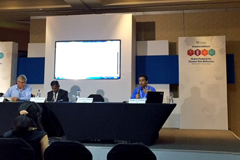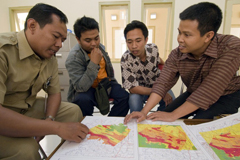JICA-RI Researcher Gomez Discusses Ways to Connect Recovery to Prevention at Global Platform for Disaster Risk Reduction
2017.06.23
JICA Research Institute (JICA-RI) Research Fellow Oscar A. Gomez participated in the 2017 Global Platform for Disaster Risk Reduction, held during May 22–26, 2017, in Cancun, Mexico. At a side event that was jointly organized by JICA and the International Recovery Platform (IRP) on May 26, he spoke about his experiences and challenges in connecting recovery from disaster to risk reduction in the long term.
The Global Platform, which is organized by the United Nations Office for Disaster Risk Reduction (UNISDR), is the world's foremost forum for strategic advice, coordination, partnership development, and the review of global progress in the implementation of international instruments on disaster risk reduction through better communication and coordination among stakeholders.

Research Fellow Oscar A. Gomez gave a presentation (right)
The Platform brought together approximately 6,000 participants, including those within governments, the private sector, civil society organizations, and academia from more than 180 countries.
Gomez participated in the session "Innovative Actions on Build Back Better: Unpacking International and Local Cooperation Experiences." He started by explaining the continuum of crisis management as an important framework for ensuring a “build back better” approach toward making societies more resilient. He presented JICA-RI research results on the basis of the “Comparative Study of Humanitarian Crisis Management from the Perspective of Bilateral Cooperation Agencies" project (see link below), particularly on three case studies regarding Honduras, Indonesia, and the Philippines. He presented the following findings:
First, local ownership is fundamental as local institutions and actors are the ones that connect recovery to long-term prevention through their work and daily lives. Both the 1998 Hurricane Mitch in Honduras and the 2004 Indian Ocean Tsunami in Indonesia spurred the creation of local institutions for disaster risk reduction, which have catalyzed subsequent work on disaster-affected areas. However, the stronger the local ownership, the weaker the donor coordination, and low levels of coordination could cause reversion to donor support limited to relief. Thus, strategies need to be formulated to promote emergency-mobilized resources supporting recovery and long-term prevention.
Second, it is crucial to share the vision identifying the opportunities that come with disasters as they make everyone push in the same direction. However, vision without knowledge does not work. After the 2006 Java Earthquake hit, the Indonesian government applied lessons that were learned from the 2004 Indian Ocean Tsunami in linking support for recovery to prevention, particularly in relation to housing. However, sustaining good practices beyond recovery has been a major challenge requiring further research for internalization.
Last, changes in mindsets and in institutional arrangements seem to be beyond the opportunities that a single mega-disaster offers at least at the country level. Hence, it seems that one should not lay too much emphasis on the power of disasters to bring about change.

Local stakeholders discuss hazard map preparation as part of a disaster risk reduction project assisted by JICA (Photo: JICA/Kenshiro Imamura)
He closed his presentation by stating that it may be difficult to dissociate support after crises from relief at the supply level; hence, local institutions receiving aid would be better placed in finding ways to buffer resources mobilized during an emergency and reallocating them later for recovery or prevention. That was the experience of Japan after the Great East Japan Earthquake.
JICA participated in various sessions and communicated JICA's activities at the Platform.

事業事前評価表(地球規模課題対応国際科学技術協力(SATREPS)).国際協力機構 地球環境部 . 防災第一チーム. 1.案件名.国 名: フィリピン共和国.

事業事前評価表(地球規模課題対応国際科学技術協力(SATREPS)).国際協力機構 地球環境部 . 防災第一チーム. 1.案件名.国 名: フィリピン共和国.

事業事前評価表(地球規模課題対応国際科学技術協力(SATREPS)).国際協力機構 地球環境部 . 防災第一チーム. 1.案件名.国 名: フィリピン共和国.

事業事前評価表(地球規模課題対応国際科学技術協力(SATREPS)).国際協力機構 地球環境部 . 防災第一チーム. 1.案件名.国 名: フィリピン共和国.

事業事前評価表(地球規模課題対応国際科学技術協力(SATREPS)).国際協力機構 地球環境部 . 防災第一チーム. 1.案件名.国 名: フィリピン共和国.
scroll